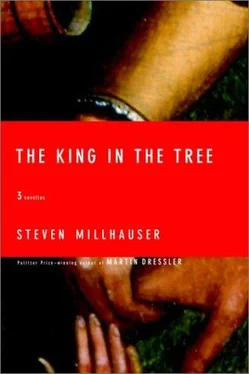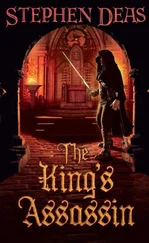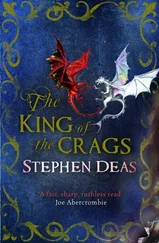The next morning the King met in Council with his advisers and chief barons, who were divided over the question of punishment for Oswin. Some urged death by hanging, others demanded that the steward be blinded for the crime of looking upon the Queen lasciviously, and still others pleaded for mercy because of the steward’s record of long and honorable service to the crown. In the end the King took a middle course: he ordered that one of Oswin’s eyes be put out, as a warning to the second eye, and that the steward be confined in the tower prison, his duties and privileges to be assumed by the under-steward, John de Beaumont.
The King praised Tristan as a protector of the realm and a true and loyal knight.
After the Council, a festive dinner was held in the late morning, in celebration of Tristan’s return. The feast began with a boar’s head decorated with red and green banners, and there followed peacocks and plovers, cranes and suckling pigs, platters of swans roasted in their feathers. Pears spitting out juice turned slowly over the hearth fire. The Queen sat at the King’s left hand, Tristan at his right. All the court could see the King turning his head from one to the other, his eyes shining, his face eloquent with affection.
In the afternoon the King gave up his hunt to walk in his garden with the Queen and Tristan. Afterward, in the King’s bedchamber, Tristan played the harp and drew tears from the King’s eyes.
Games, songs, and dances are planned for the evening. It is said that two acrobats from Anjou will dance on balls while juggling apples.
The King hunts rapturously from early morning to nightfall, leaving the Queen and Tristan behind. More: he has requested Tristan to keep watch over the Queen, to remain in her company whenever possible, to guard and protect her, to cheer her when she is sad, to read to her from the royal chest of ivory-bound books, to play the harp for her. Tristan and the Queen are much alone.
Sometimes I see ladies exchange knowing glances, after the Queen and Tristan pass by.
This afternoon I overheard a baron speaking in a low voice to two admiring ladies. Does the King know what he is doing? the baron wondered. Does he understand that he is inviting his own betrayal?
To be satisfied with such questions — questions that naturally present themselves, and that seem to strike boldly at the innermost workings of the King’s mind — is to reveal nothing but a courtier’s worldly cleverness. In order to understand the King, we must be at once more simple and more devious. The King is by no means oblivious; he has not forgotten the rumors surrounding his wife and Tristan. But the King’s love for Tristan runs deeper than his jealousy, and what he loves in Tristan is above all his trustworthiness, the purity of his honor. When the King leaves Tristan alone with the Queen, he is displaying to the world the drama of his deepest conviction: my wife is beautiful, my wife is desirable, but Tristan is true. Whisper, barons, whisper, world — but Tristan is honorable. The King is not ignorant of the whispers; he may even wish to encourage them, in order to sharpen his trust against them.
To say it another way, the King arranges opportunities for betrayal precisely because it cannot take place. In the same way, he does not arm himself before Tristan, for he knows that Tristan will not suddenly draw his sword and plunge it treacherously through his side.
These thoughts, in the pauses of my day, do not bring peace.
Last night the King reported to me a marvelous dream. He was standing in the middle of a dark chamber between two windows that faced each other. The windows were brilliant with light, but the light did not enter the room. He looked now at one, now at the other, and felt a great yearning to see the view. His body began to strain in both directions. With burning pain he felt himself ripping and tearing; there were sounds like breaking sticks. One half of his body moved toward one window, and one half toward the other. Blood, black and thick, poured from the open sides.
He did not ask me to interpret his dream.
Sometimes at night I hear, in Tristan’s nearby chamber, the sound of the iron bar sliding back, scraping through rings of iron. I listen for the prolonged creak of the door, like the cry an animal might make if it had been turned to wood, and the pad of Tristan’s footsteps as he leaves his chamber. Sooner or later I hear the more distant cry of another door; footsteps emerge from the King’s bedchamber. The two pairs of footsteps move off together and vanish in the night.
Where do they go? Upstairs, through the women’s quarters, to the Queen’s private chamber? Across the courtyard into the Queen’s garden or tower? Through the postern that leads out into the orchard?
And if the King should wake?
It cannot continue much longer. The King, clinging fiercely to Tristan’s loyalty, but troubled by doubts and suspicions, studies his nephew’s face sharply while contriving new occasions for disaster. Today the Queen and Tristan went hunting with the King and his barons. I too was of the party. The King, observing that the Queen grew tired, led her to one of his well-furnished hunting lodges, where he instructed her to remain with Tristan until he returned to fetch them at nightfall. The Queen protested; the King insisted. Scarcely had we ridden off when the King came to a halt and asked me to wait while he returned to ask something of the Queen. I waited in great uneasiness, dismounting and mounting again. Not long afterward the King came riding through the trees, looking displeased.
“Is the Queen well?” I called.
“After all,” he cried back at me, “I did not wish to disturb her.” He spurred his horse sharply and rode off in the direction of the hunt.
In the night the King came to me. I sat up in readiness, but he urged me to lie down, for he wished only to talk. He climbed into the bed and lay down beside me in the dark.
“Like old times, Thomas,” he said, and I remembered the days when the young Prince would come to my chamber at night, to lie down beside me and speak his heart.
“In the night,” the King began, “one can say anything.
“I know what the court is saying,” he said.
“And yet,” he continued, “it is absolutely right that they should wish to be together. Who dares to say no? Speak, Thomas.”
“No one, my lord.”
“I want Tristan to love her.”
“Then all is well.”
“All is not well. Rumors — touching upon my honor — the honor of my court—”
“You invite them to be alone.”
“When she is with Tristan, she is with me.”
“Then she is always with you.”
“Tristan — Tristan would never shame me. He would die for me. Thomas! Speak from the heart.”
I hesitated for the breath of an instant. “Tristan would die for you.” It was true: Tristan would defend the King to the death.
I could hear the King breathing heavily in the dark. I thought of Tristan walking with the Queen in the orchard, their hands clasped, walking so slowly that they were scarcely moving.
The King seized my arm. “Thank you, Thomas.” Within moments he had fallen asleep beside me, while I lay waking in the dark.
How much longer? Two days have passed since the King’s night visit, and he is more suspicious than ever. This morning he announced that he would not go hunting, then suddenly changed his mind and rode off furiously, but returned at midday. He found the Queen alone with her companions in the women’s quarters. Tristan was at the mews, training a young falcon to stand on his wrist.
The day before, when the King was hunting, I sent a message to Brangane. We met at the King’s garden, in the shadow of the wall. I opened the wicker gate for her and led her to the turf bench beside the fountain of leopards. Gone was her timid and mistrustful look; she was now alert, expectant, tensely still. Her hands lay not quite crossed in her lap, one hand grasping the wrist of the other. There was no need for courteous indirection. I spoke of the rumors, and of the King’s suspicions, and urged her to warn her mistress to be more careful — to avoid behavior that might give rise to talk.
Читать дальше












